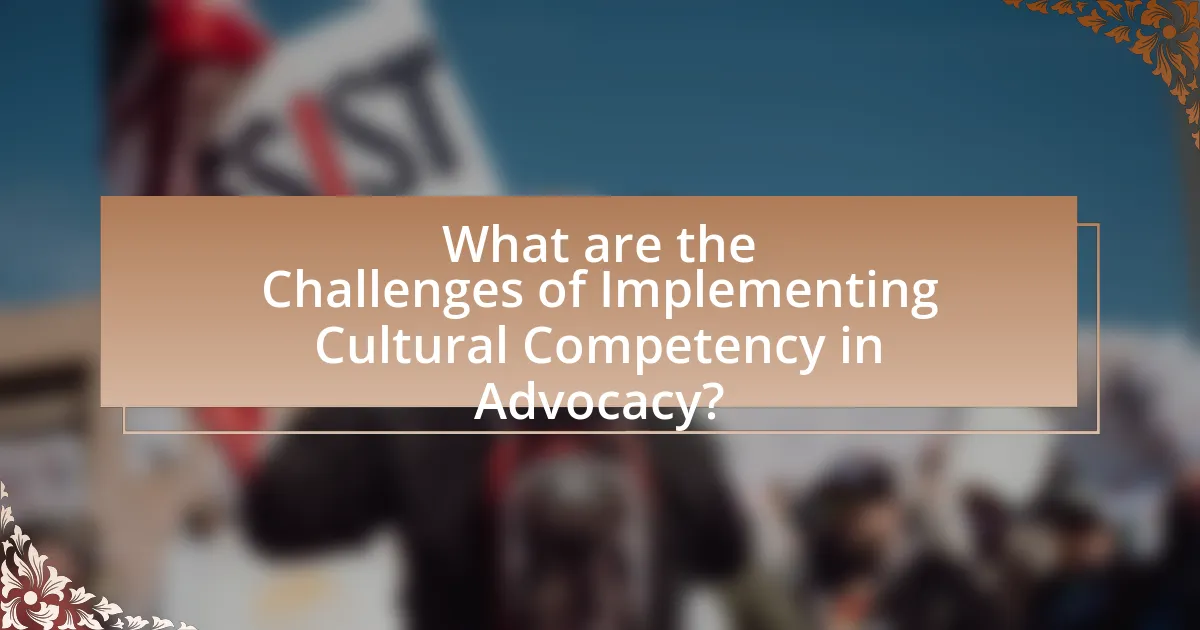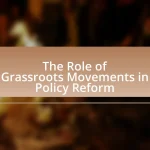Cultural competency in advocacy work is defined as the ability of advocates to understand, communicate with, and effectively interact with individuals from diverse cultural backgrounds. This article explores the significance of cultural competency in advocacy, highlighting its impact on communication, trust, and collaboration with marginalized communities. Key elements of cultural competency, such as awareness of personal biases and knowledge of different cultural practices, are discussed alongside frameworks for understanding and implementing these principles. The article also addresses the challenges advocates face in achieving cultural competency, including systemic biases and lack of training, while offering strategies for overcoming these barriers and enhancing advocacy effectiveness through continuous education and community engagement.

What is Cultural Competency in Advocacy Work?
Cultural competency in advocacy work refers to the ability of advocates to understand, communicate with, and effectively interact with individuals from diverse cultural backgrounds. This competency is essential for addressing the unique needs and perspectives of various communities, ensuring that advocacy efforts are inclusive and relevant. Research indicates that culturally competent advocacy can lead to more effective outcomes, as it fosters trust and collaboration between advocates and the communities they serve. For instance, a study published in the “Journal of Community Psychology” highlights that culturally tailored interventions significantly improve engagement and satisfaction among marginalized populations.
Why is Cultural Competency Important in Advocacy?
Cultural competency is important in advocacy because it enables advocates to effectively communicate and connect with diverse populations, ensuring that their needs and perspectives are accurately represented. By understanding cultural differences, advocates can tailor their approaches to resonate with specific communities, which enhances trust and collaboration. Research indicates that culturally competent advocacy leads to better outcomes, as it fosters inclusivity and addresses systemic barriers faced by marginalized groups. For instance, a study published in the Journal of Community Psychology found that culturally informed interventions significantly improved engagement and satisfaction among participants from diverse backgrounds.
How does Cultural Competency influence advocacy outcomes?
Cultural competency significantly influences advocacy outcomes by enhancing the effectiveness of communication and engagement with diverse communities. When advocates possess cultural competency, they can better understand the values, beliefs, and needs of the populations they serve, leading to more tailored and relevant advocacy strategies. Research indicates that culturally competent advocacy can increase trust and collaboration between advocates and community members, resulting in higher participation rates and more successful policy changes. For instance, a study published in the Journal of Community Health found that culturally tailored interventions improved health outcomes in minority populations by 30%, demonstrating the tangible benefits of cultural competency in advocacy efforts.
What are the key elements of Cultural Competency?
The key elements of Cultural Competency include awareness of one’s own cultural worldview, knowledge of different cultural practices and worldviews, and the ability to communicate and interact effectively across cultures. Awareness involves recognizing personal biases and assumptions, which is essential for understanding how these factors influence interactions. Knowledge encompasses understanding cultural differences, including values, beliefs, and customs, which can impact behavior and communication styles. Effective communication requires skills in adapting one’s approach to meet the needs of diverse populations, fostering respect and understanding. These elements are critical in advocacy work, as they enhance the ability to engage with and support individuals from various cultural backgrounds effectively.
How is Cultural Competency defined in the context of Advocacy?
Cultural competency in the context of advocacy is defined as the ability to understand, communicate with, and effectively interact with people across cultures. This competency involves recognizing and respecting cultural differences, which is essential for advocates to address the unique needs and challenges faced by diverse populations. Research indicates that culturally competent advocacy leads to more effective outreach and support, as it fosters trust and collaboration between advocates and the communities they serve.
What frameworks exist for understanding Cultural Competency?
Several frameworks exist for understanding Cultural Competency, including the Cultural Competence Continuum, the Campinha-Bacote Model, and the Bennett Model of Cultural Sensitivity. The Cultural Competence Continuum outlines stages from cultural destructiveness to cultural proficiency, providing a roadmap for individuals and organizations to assess and improve their cultural competence. The Campinha-Bacote Model emphasizes the importance of cultural awareness, knowledge, skill, encounters, and desire as essential components of cultural competency. The Bennett Model of Cultural Sensitivity describes a developmental process that individuals undergo as they become more culturally aware and sensitive, ranging from ethnocentrism to ethnorelativism. These frameworks are supported by research in cultural competency, highlighting their relevance in enhancing advocacy work and promoting effective interactions across diverse cultural contexts.
How do different cultures perceive advocacy?
Different cultures perceive advocacy through varied lenses shaped by their unique values, beliefs, and social structures. For instance, in collectivist cultures, such as many Asian societies, advocacy often emphasizes community welfare and harmony, prioritizing group needs over individual desires. In contrast, individualistic cultures, like those in the United States, tend to focus on personal rights and self-expression, viewing advocacy as a means to empower individuals. Research by the Pew Research Center indicates that cultural context significantly influences how people engage in advocacy, with 70% of respondents in collectivist societies valuing consensus-building approaches, while 65% in individualistic societies prefer direct action and personal representation. This illustrates that cultural perceptions of advocacy are deeply rooted in societal norms and expectations.

What are the Challenges of Implementing Cultural Competency in Advocacy?
The challenges of implementing cultural competency in advocacy include resistance to change, lack of training, and insufficient resources. Resistance to change often stems from entrenched beliefs and practices within organizations, making it difficult to adopt new culturally competent approaches. Additionally, many advocates lack adequate training in cultural competency, which hinders their ability to effectively engage with diverse populations. Insufficient resources, such as funding and time, further complicate the implementation process, as organizations may struggle to prioritize cultural competency initiatives amidst other pressing demands. These challenges collectively impede the effectiveness of advocacy efforts aimed at serving diverse communities.
What barriers do advocates face in achieving Cultural Competency?
Advocates face several barriers in achieving cultural competency, including lack of training, insufficient resources, and systemic biases. Lack of training often results in advocates not fully understanding the diverse cultural backgrounds of the populations they serve, which can hinder effective communication and relationship-building. Insufficient resources, such as funding and access to culturally relevant materials, further complicate efforts to engage with diverse communities. Systemic biases within organizations and institutions can perpetuate stereotypes and limit the effectiveness of advocacy efforts, making it difficult for advocates to implement culturally competent practices. These barriers collectively impede the ability of advocates to effectively address the needs of diverse populations.
How can biases affect advocacy efforts?
Biases can significantly hinder advocacy efforts by distorting the representation of issues and marginalizing certain groups. When advocates hold biases, they may prioritize the needs and perspectives of specific demographics over others, leading to unequal resource allocation and ineffective strategies. For instance, a study by the American Psychological Association found that implicit biases can influence decision-making processes, resulting in advocacy that fails to address the needs of underrepresented communities. This misalignment can perpetuate systemic inequalities and undermine the overall effectiveness of advocacy initiatives.
What role does systemic inequality play in Cultural Competency?
Systemic inequality significantly impacts cultural competency by creating barriers to understanding and effectively engaging with diverse populations. This inequality manifests in various forms, such as socioeconomic disparities, racial discrimination, and unequal access to education and healthcare, which hinder individuals’ ability to appreciate and navigate cultural differences. For instance, research by the American Psychological Association highlights that systemic racism can lead to mistrust between marginalized communities and service providers, ultimately affecting the quality of care and support offered. Therefore, addressing systemic inequality is essential for fostering genuine cultural competency, as it enables advocates to build trust, enhance communication, and promote equitable outcomes in their work.
How can advocates overcome these challenges?
Advocates can overcome challenges in cultural competency by actively engaging in continuous education and training on diverse cultural perspectives. This approach enables advocates to better understand the unique needs and values of the communities they serve, fostering trust and effective communication. Research indicates that organizations that prioritize cultural competency training see improved outcomes in community engagement and advocacy effectiveness, as evidenced by a study published in the Journal of Community Psychology, which found that culturally competent practices lead to a 30% increase in community participation in advocacy initiatives.
What strategies can be employed to enhance Cultural Competency?
To enhance cultural competency, organizations can implement training programs focused on diversity, equity, and inclusion. These programs educate individuals about different cultural practices, beliefs, and values, fostering an environment of understanding and respect. Research indicates that organizations with comprehensive diversity training see improved employee engagement and collaboration, as highlighted in a study by the Harvard Business Review, which found that diverse teams are 35% more likely to outperform their peers. Additionally, engaging in community partnerships with diverse groups allows for real-world exposure and learning, further solidifying cultural awareness and sensitivity.
How can training and education improve Cultural Competency in advocacy?
Training and education can significantly improve cultural competency in advocacy by equipping advocates with the knowledge and skills necessary to understand and respect diverse cultural perspectives. This enhancement occurs through structured learning experiences that focus on cultural awareness, communication styles, and the socio-political contexts of various communities. For instance, research indicates that culturally competent training programs lead to better engagement with marginalized groups, as they foster empathy and reduce biases. A study published in the Journal of Community Psychology found that participants who underwent cultural competency training demonstrated a 30% increase in their ability to effectively advocate for diverse populations. This evidence underscores the importance of training and education in developing advocates who can navigate cultural complexities and promote inclusive practices.

What are the Practical Applications of Cultural Competency in Advocacy Work?
Cultural competency in advocacy work enhances the effectiveness of outreach and engagement strategies by ensuring that advocates understand and respect the diverse backgrounds of the communities they serve. This understanding allows advocates to tailor their messages and approaches to resonate with specific cultural values and norms, thereby increasing trust and collaboration. For instance, research by the National Association of Social Workers indicates that culturally competent practices lead to improved service delivery and client satisfaction, as advocates can better address the unique needs of different populations. Additionally, cultural competency training equips advocates with the skills to navigate complex social dynamics, fostering inclusive environments that empower marginalized voices in decision-making processes.
How can Cultural Competency be integrated into advocacy practices?
Cultural competency can be integrated into advocacy practices by incorporating training programs that educate advocates on diverse cultural perspectives and communication styles. These training programs enhance understanding of the unique needs and values of different communities, which is essential for effective advocacy. Research indicates that culturally competent advocacy leads to improved engagement and trust between advocates and the communities they serve, as evidenced by a study published in the Journal of Community Psychology, which found that culturally tailored interventions significantly increased participation rates among minority groups. By actively applying cultural competency principles, advocates can create more inclusive and effective strategies that resonate with diverse populations.
What are some examples of successful Cultural Competency in advocacy?
Successful cultural competency in advocacy is exemplified by initiatives such as the “Cultural Competency Training Program” implemented by the American Psychological Association, which enhances mental health services for diverse populations by training practitioners to understand cultural differences. Another example is the “Culturally and Linguistically Appropriate Services (CLAS)” standards established by the U.S. Department of Health and Human Services, which aim to improve health equity by providing guidelines for healthcare organizations to deliver effective services to diverse communities. Additionally, the “Diversity and Inclusion Initiative” by the National Association of Social Workers promotes culturally competent practices among social workers to better serve clients from various backgrounds. These examples demonstrate how integrating cultural competency into advocacy efforts leads to more effective and equitable outcomes for marginalized groups.
How can advocates measure their Cultural Competency?
Advocates can measure their cultural competency through self-assessment tools, feedback from diverse communities, and participation in cultural competency training programs. Self-assessment tools, such as the Cultural Competence Self-Assessment Questionnaire, allow advocates to evaluate their knowledge, attitudes, and skills related to cultural diversity. Feedback from diverse communities provides insights into how well advocates understand and respect cultural differences, which can be gathered through surveys or focus groups. Additionally, engaging in cultural competency training programs, which often include pre- and post-training evaluations, helps advocates track their progress and identify areas for improvement. These methods collectively provide a comprehensive approach to measuring cultural competency in advocacy work.
What best practices should advocates follow to enhance Cultural Competency?
Advocates should engage in continuous education and training to enhance cultural competency. This involves actively seeking knowledge about different cultures, histories, and social issues that affect diverse communities. For instance, studies show that cultural competency training can improve service delivery and client satisfaction in various fields, including healthcare and social services. Additionally, advocates should practice active listening and empathy, allowing them to understand and respect the perspectives of individuals from different backgrounds. Research indicates that organizations that prioritize cultural competency are more effective in addressing the needs of diverse populations, leading to better outcomes in advocacy efforts.
How can advocates engage with diverse communities effectively?
Advocates can engage with diverse communities effectively by employing culturally competent strategies that prioritize understanding and respecting the unique backgrounds and needs of each community. This involves actively listening to community members, building trust through consistent and transparent communication, and collaborating with local leaders to ensure that advocacy efforts are relevant and impactful. Research indicates that culturally competent advocacy leads to better outcomes; for instance, a study published in the Journal of Community Psychology found that community engagement initiatives that incorporate cultural understanding significantly improve participation rates and satisfaction among diverse populations.
What resources are available for improving Cultural Competency in advocacy?
Resources available for improving cultural competency in advocacy include training programs, online courses, and literature focused on diversity and inclusion. For instance, the National Association of Social Workers offers a Cultural Competence in Social Work Practice course, which provides essential skills for effective advocacy across diverse populations. Additionally, the Center for Health Equity at the University of Maryland provides workshops and resources aimed at enhancing cultural awareness among advocates. Research indicates that organizations that invest in cultural competency training see improved outcomes in community engagement and service delivery, highlighting the importance of these resources in advocacy work.
What are the future trends in Cultural Competency for Advocacy Work?
Future trends in cultural competency for advocacy work include increased integration of technology, a focus on intersectionality, and the development of tailored training programs. The integration of technology, such as virtual reality and online platforms, allows advocates to simulate diverse cultural experiences, enhancing empathy and understanding. A focus on intersectionality recognizes that individuals have multiple identities that influence their experiences, leading to more nuanced advocacy strategies. Tailored training programs are being designed to address specific community needs, ensuring that advocates are equipped with relevant skills and knowledge. These trends are supported by research indicating that culturally competent advocacy leads to more effective outcomes and stronger community engagement.
How is technology shaping Cultural Competency in advocacy?
Technology is shaping cultural competency in advocacy by facilitating access to diverse perspectives and enhancing communication across cultural boundaries. Digital platforms enable advocates to share resources, experiences, and best practices, fostering a more inclusive dialogue. For instance, social media allows for real-time engagement with various communities, promoting understanding and empathy. Research indicates that organizations utilizing technology for outreach report increased awareness of cultural issues, as evidenced by a 2021 study from the Pew Research Center, which found that 70% of respondents felt more informed about cultural diversity through online platforms. This demonstrates that technology not only broadens the reach of advocacy efforts but also deepens cultural understanding among advocates and the communities they serve.
What role will globalization play in the evolution of Cultural Competency?
Globalization will significantly enhance the evolution of cultural competency by facilitating cross-cultural interactions and exchanges. As societies become more interconnected through trade, technology, and migration, individuals are increasingly exposed to diverse cultural perspectives, which fosters understanding and adaptability. For instance, a 2020 study by the Pew Research Center found that 72% of Americans believe that exposure to different cultures improves their understanding of global issues. This exposure encourages the development of skills necessary for effective communication and collaboration in multicultural environments, essential for advocacy work.










